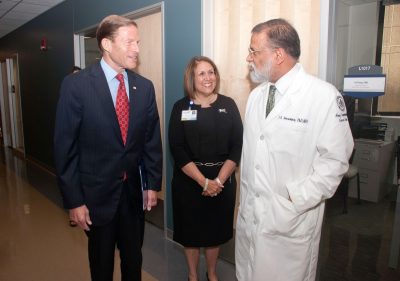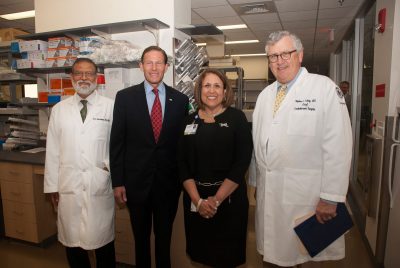
Chief Executive Officer, John Dempsey Hospital, and Dr. Pramod Srivastava during his recent visit to UConn Health. (Janine Gelineau/UConn Health photo)
U.S. Sen. Richard Blumenthal recently met with UConn Health officials to discuss the important role data registries will play in the future of health care in Connecticut and across the country. All health care stakeholders, organizations, providers, insurers, and patients, have questions related to the medical care they are receiving or providing. The answers to these questions should be accessible in registries providing patients the data they need to make informed health care decisions and allowing health care organizations to report and benchmark their quality measures against other providers.
“Beyond participation in national data registries, it will be the changes in clinical practice, based on the rigorous data analysis that will define meaningful improvements in health care delivery. The commitment to total outcome transparency will be anxiety provoking at first but, in the end, it will be the ‘quality tide’ that raises all boats: improved patient outcomes, optimal practitioner performance, and value-added, highest quality care that third party payers will demand,” says Dr. Stephen Lahey, chief of cardiothoracic surgery, and vice chair of quality improvement at UConn Health.

During his visit, Blumenthal also toured the research lab of Dr. Pramod Srivastava, professor of immunology and medicine and director of the Carole and Ray Neag Comprehensive Cancer Center. Blumenthal learned about Srivastava’s recently approved FDA genomics-driven clinical study for patients with advanced stage ovarian cancer, in which personalized cancer vaccines will be developed for each patient.